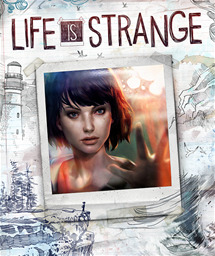Dontnod’s Life is Strange relies on a player’s emotion to empathize with the game, to make choices within the game and to understand and come to terms with how their emotions have impacted the game and themselves.
Dontnod creates empathy by using familiar settings and relatable characters to elicit the player’s emotion in their decision-making. We care about the residents of Arcadia Bay because each one is a stand in for the people in our lives. We see a lot of ourselves in Max, either her morality or her kindness or her longing for friendship. Chloe is our best friend, always there, always supportive, ready to do anything. Victoria and Nathan are the popular assholes no one likes; Kate is that poor friend who’s in a bad situation; Chloe’s mom is the doting mother, always ready to provide pancakes or advice or reprimands. Dontnod uses this familiarity to create empathy for the characters, and to bring our emotion into decision-making. Nathan’s an asshole and we want to nail him to the wall. We sympathize with how much Kate hurts and we desperately want to help. We love Chloe like a sister and only want to see her happy. Life is Strange mirrors the setting of our lives so that we bring our emotions into the tragedies of the game’s story.
This emotional buy-in is essential to Life is Strange because our emotions dictate how the game plays out. In gaming, there is a “correct” way to overcome an obstacle or make a decision. In Life is Strange, our decision, even when tinged with emotion, is always right. Victoria irks us in every scene she is in. If we desire, we can cover her with paint and take a picture or we can take the high road. We can find a peaceful solution to our problems with Frank, or let Chloe kill him. Neither of these decisions is right or wrong according to the game. We, as the player, decide the right solution based on how we feel about the outcome. If we hate Victoria, then we return her insults. If we hate Frank so much that we accept his death, then that is how the story proceeds. However, if an outcome makes us sad or angry or frustrated, we can rewind time to choose a more emotionally appropriate solution. We may hate Frank, but our love for Chloe means we don’t want her to feel guilt, so we write the story that Frank doesn’t die. Our emotions drive the story for the game. The emotional punch is when we make a decision that is emotionally right, and then we see the consequences.
Throughout the game, our emotions influence our decisions, but at critical moments Dontnod shows us the consequences of acting on emotion. When feel sympathy for Kate Marsh, we can speak with her and learn about her and eventually save her. By heeding our emotions and being sympathetic we saved a person’s life. On the other hand, we feel sympathy for Chloe losing her father, so we travel into the past to save William. Our sympathy ends up ruining Chloe’s life. We crippled Chloe, we bankrupted the Prices, and we forced her to ask Max to let her die. Acting on our emotions in this instance made everything worse. We must bear the brunt of responsibility for our actions, good or bad. We made the decisions that ruined other people’s lives or saved them. Our emotions drive the action of the game. In the final decision, between Chloe and Arcadia Bay, we have to separate our emotions from our morals to make a decision. Sacrificing Chloe is morally right but emotionally tragic. Sacrificing Arcadia Bay is morally selfish, but emotionally triumphant. The final decision is the culmination of Dontnod’s argument about the responsibility of choice.
Dontnod’s Life is Strange relies on a player’s emotion to empathize with the game, to make choices within the game and to understand and come to terms with how their emotions have impacted the game and themselves. Familiar characters encourage empathy and emotion in gameplay. As our emotions strengthen they dictate how the story progresses. In the end, we see that choices we made, based of emotion, impact the world positively or, more often, incredibly negatively. Life is Strange is a game about the responsibility of your decisions. Sometimes, emotions take control and they decide. Other occasions see morality and a cooler head prevail. Either way, we made the decision and the triumph or guilt we feel throughout the game is exponentially more incisive and powerful because of this. That pain or pleasure either reinforces our decision or fills us with regret at having made it. With final decision, Dontnod makes the point that it doesn’t matter how the decision was made, but that the important part is how you live with the decision. I loved Chloe, but I couldn’t sacrifice an entire town to save her. That was the hardest decision I’ve ever made in a videogame. I made a moral choice, but I was hurting for a long time after the credits rolled. I felt guilt, I felt loss, seeing Max break down in the bathroom broke my heart, but it was the right decision. Others will be on the other side. Their connection to the town was less important than their connection to Chloe. Although the outcome was different, for each of us it was right.

Log in to comment